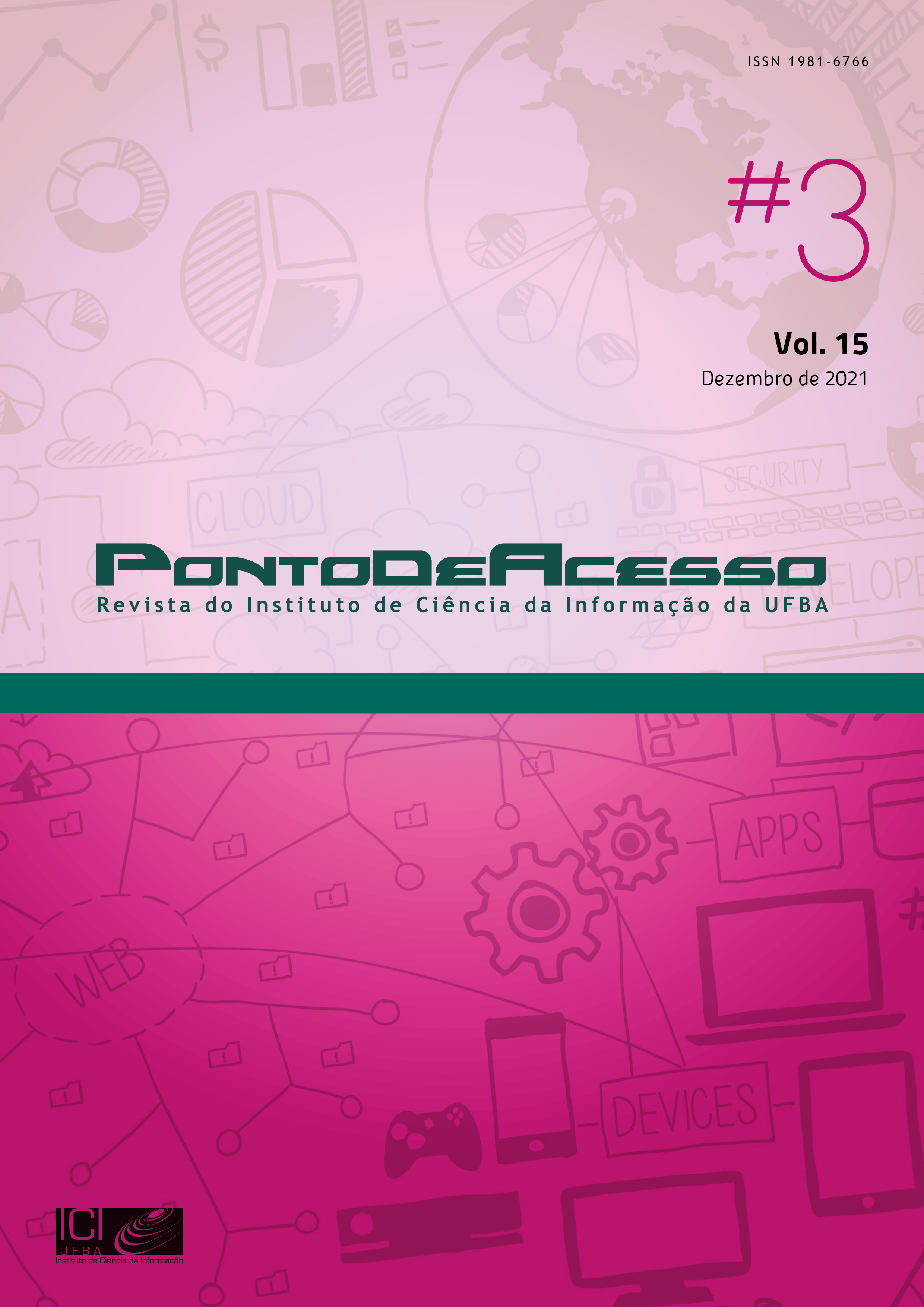APPLICABILITY OF FOLKSONOMY IN THE CONSTRUCTION AND UPDATE OF HYBRID KNOWLEDGE ORGANIZATION SYSTEMS
DOI:
https://doi.org/10.9771/rpa.v15i3.47473Keywords:
Folksonomy, Knowledge Representation, Knowledge Organization, Hybrid Knowledge Organization SystemsAbstract
Studies aspects related to Folksonomy and the collaborative representation of information in Information Retrieval Systems. Presents its main characteristics, positive and negative implications in the process of representation and information retrieval. General objective is to analyze the applicability of Folksonomy in the process of building and updating hybrid Knowledge Organization Systems, based on the results of national and international research in the literature. Uses bibliographic, exploratory, descriptive research with a qualitative approach as a methodology. Highlights the main contributions of the tools that combine the systematized structure of traditional knowledge representation tools with the latent semantics of Folksonomy in Information Retrieval Systems. Presents proposals that explore the potential of Folksonomy with the support of formalisms and methods used in the construction of terminological control instruments, revealing new perspectives to help the representation and exchange of knowledge in a web environment.
Downloads
References
ADLER, M. Transcending Library Catalogs: A comparative study of Controlled terms in Library of Congress Subjects Headings and User-Generated Tags in Libraything for transgender Books. Journal of web librarianship, [s. l.], v. 3, n. 1, p. 309-331, 2009.
ALRUQIMI, M.; AKNIN, N. Bridging the gap between the social and semantic web: extracting domain-specific ontology from Folksonomy. Journal of Kin Saud University- Computer and Information Sciences, [s. l.], v. 31, n. 1, p. 15-21, Jan. 2019.
ALVES, H. A. Ontologias folksonomizadas: uma abordagem para a fusão de ontologias e folksonomias. 2012. Dissertação (Mestrado em Ciências da Computação) − Universidade Estadual de Campinas, Campinas, 2012.
AQUINO, M. A.; SANTANA, V. A. Práticas de organização e representação da informação étnico-racial em bibliotecas universitárias: necessidade de preservação da memória de negros. RICI: Revista Ibero-americana de Ciência da Informação, Brasília, v. 6, n. 2, p. 17-36, ago./dez. 2013.
BARITÉ, M. La garantia literária como herramenta de revisión de sistemas de organización del conocimiento: modelo y aplicación. 2011. Tese (Doutorado em Informação Científica) – Faculdad de Comunicación y Documentación, Universidade de Granada, Granada, 2011.
BEGHTOL, C. Bibliographic Classification Theory and Text Longuistics: Aboutness Analysis, Intertextuality and the Cognitive Act of Classifying. Journal of Documentation, Bradford, v. 42, n. 2, p. 84-113, 1986.
CORRÊA, R. F.; SANTOS, R. F. Análise das definições de Folksonomia: em busca de uma síntese. Perspectivas em Ciência da Informação, Belo Horizonte, v. 23, n. 2, p. 1-32, abr./jun. 2018.
GOLDER, S.; HUBERMAN, B. A. The structure of collaborative tagging systems. 2005. Disponível em: https://www.researchgate.net/publication/1958429_The_Structure_of_Collaborative_Tagging_Systems. Acesso em: 02 set. 2021.
GRUBER, T. Ontology of Folksonomy: A Mash-up of Apples and Oranges. In: CONFERENCE ON METADATA AND SEMANTICS RESEARCH (MTSR), 2005. [S. l.]. Proceedings [...]. [S. l.]: Rinton, 2005.
GUEDES, R. M. O princípio da garantia semântica e os estudos da linguagem. 2016. Tese (Doutorado em Ciência da Informação) – Universidade Federal de Minas Gerais, Belo Horizonte, 2016.
HALL, S. Cultura e representação. Rio de Janeiro: Ed. PUC-Rio: Apicuri, 2016.
KIU, C.; TSUI, E. TaxoFolk: A hybrid taxonomy-folksonomy classification for enhanced knowledge navigation. Knowledge Management Research & Practice, [s. l.], v. 8, n. 1, p. 24-32, 2010.
KWASNIK, B. H. Semantic Warrant: a pivotal concept for our field. Knowledge Organization, [s. l.], v. 37, n. 2, p. 106-110, Apr. 2010.
LIMPENS, F.; GANDON, F.; BUFFA, M. Linking folksonomies
and ontologies for supporting knowledge sharing: a state of the art. [S. l.: s. n.], 2009.
MANYIKA, J. et al. Big data: The next frontier for innovation, competition, and productivity. [S. l.]: McKinsey Global institute, 2011.
MOREIRA, W. Sistemas de Organização do Conhecimento: aspectos teóricos, conceituais e metodológicos. 2018. Tese (Livre-Docência em Sistemas de Organização do Conhecimento) − Faculdade de Filosofia e Ciências, Universidade Estadual Paulista “Júlio de Mesquita Filho”. São Paulo, 2018.
MORVILLE, P. Ambient findability. Sebastopol: O’Really, 2005.
OLSON, H. A. The power to name: representation in library catalogs. Journal of Women in Culture and Society, [s. l.], v. 26, n. 1, p. 639-668, 2001.
QIN, C.; YAXI, L.; MOU, J. User adoption of a hybrid social tagging approach in an online
knowledge community. Aslib Journal of Information Management, [s. l.], v. 71, n. 2, 2019.
QUINTARELLI, E. Folksonomies: power to the people. In: ISKO Italy-UniMIB meeting. 2005, Milán. Proceedings [...], Milán: ISKO, 2005. Disponível em: http://www.iskoi.org/doc/folksonomies.htm. Acesso em: 20 set. 2021.
MATHES, A. Folksonomies: cooperative Classification and Communication Through Shared Metadata. [S. l.: s. n.], 2004. Disponível em: https://adammathes.com/academic/computer-mediated-communication/folksonomies.html. Acesso em: 20 set. 2021.
MIKA, P. Ontologies are Us: a Unified Model of Social Networks and Semantics. In: INTERNATIONAL SEMANTIC WEB CONFERENCE, 4., 2005. Galway, Ireland. Proceedings [...]. [S. l.]: Springer, 2005. p. 522-536.
SANTOS, R. F. Modelos colaborativos de indexação e a sua aplicabilidade na Base de Dados Referencial de Artigos de Periódicos em Ciência da Informação. 2016. Dissertação (Mestrado em Ciência da Informação) − Universidade Federal de Pernambuco, Recife, 2016.
SANTOS, R. F. et al. A representação colaborativa da informação e a
construção de linguagens documentárias sobre diversidade de gêneros: análise das
contribuições do Dicionário de Gêneros – “só quem sent epode definir”. In: ENCONTRO
NACIONAL DE PESQUISA EM CIÊNCIA DA INFORMAÇÃO, 18., 2017. Marília.
Anais eletrônicos […]. Marília: ANCIB, 2017.
SOLER MONREAL, C.; GIL LEIVA, I. Posibilidades y límites de los tesauros frente a otros sistemas de organización del conocimiento: folksonomías, taxonomías y ontologías. Revista Interamericana de Bibliotecología, [s. l.], v. 33, n. 2, p. 361-377, jul./dic. 2010. Disponível em: https://bit.ly/2NoVNrd. Acesso em: 21 jan. 2019.
SOLOMON, Y.; BRONSTEIN, J. Serendipity in legal information seeking behavior. Aslib Journal of Information Management, [s. l.], v. 68, n. 1, p. 112-134, 2016.
SPECIA, L.; MOTTA, E. Integrating folksonomies with the semantic web. In: EUROPEAN SEMANTIC WEB CONFERENCE: RESEARCH AND APPLICATIONS, 4., 2007, Innsbruck, Austria. Proceedings [...]. [S. l.]: Springer, 2007. p. 624-639.
SPITERI, L. F. Structure and form of folksonomy tags. The road to the public library cataloque. Webology, [s. l.], v. 4, n. 2, 2007.
YEDID, N. Introducción a las Folksonomías: definición, características y diferencias con los modelos tradicionales de indización. Información, cultura y sociedade, [s. l.], v. 1, n. 29, p. 13-26, 2013.
ZENG, M. L. Knowledge Organization Systems (KOS). Knowledge Organization, [s. l.], v. 35, n. 2/3, p. 160-182, 2008.
Downloads
Published
How to Cite
Issue
Section
License
Copyright (c) 2021 PontodeAcesso

This work is licensed under a Creative Commons Attribution 4.0 International License.
A PontodeAcesso utiliza a licença do Creative Commons (CC), preservando assim, a integridade dos artigos em ambiente de acesso aberto. A revista permite que o autor retenha os direitos de publicação sem restrições.








